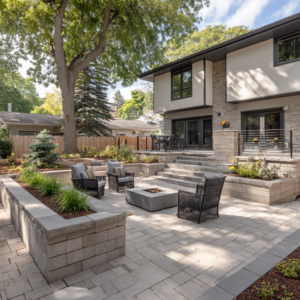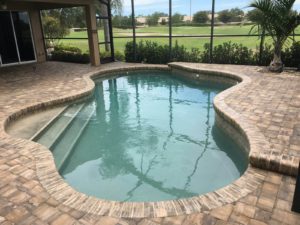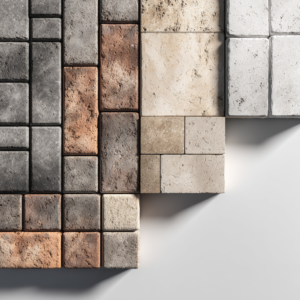Any homeowner who has ever worked in hardscape projects knows that sealing is a big part of it. Sealing pavers is a crucial step in maintaining and enhancing the beauty, durability, and longevity of your outdoor surfaces. But exactly why seal pavers?
Whether you have a driveway, patio, walkway, or pool deck, applying a sealant can offer numerous benefits that make this maintenance task well worth the investment.
In this article, we want to explain why sealing pavers should be a priority for any homeowner or property manager.
You may also like: How Much Does it Cost to Clean and Seal Pavers?
Jump to:
Why seal pavers? 7 reasons you must know
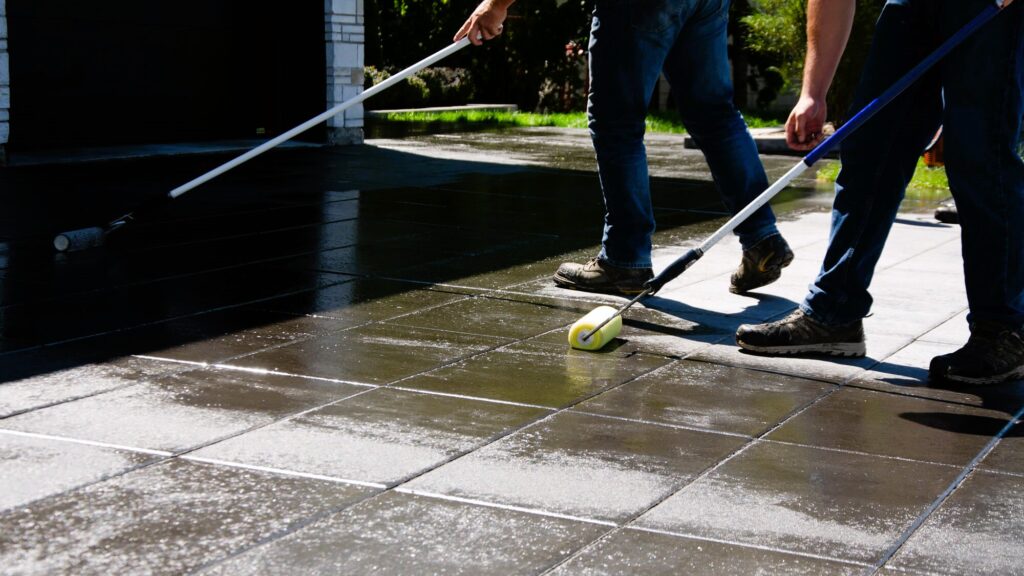
1. Enhanced appearance
This is one of the most immediate and noticeable reasons why you should seal pavers.
Sealants bring out the natural colors and textures of the pavers, giving them a vibrant and polished look. This visual improvement is particularly significant for older pavers that may have become dull or discolored over time.
Sealing can rejuvenate these surfaces, making them look new again. Furthermore, various sealant finishes—such as matte, semi-gloss, or high-gloss—allow you to customize the look of your pavers to match your aesthetic preferences.
2. Protection against stains
Paved surfaces are prone to various types of stains, from oil and grease on driveways to food and drink spills on patios. Without a sealant, these substances can penetrate the porous surface of the pavers, leading to unsightly stains that are difficult to remove.
A good sealant creates a protective barrier that prevents these substances from seeping into the pavers. This is especially important for high-traffic areas, where spills and stains are more likely to occur.
The sealant makes cleaning easier and prevents long-term damage caused by substances like motor oil, which can deteriorate the paver material over time.
3. Resistance to weather damage
Pavers are exposed to the elements year-round, which can lead to weather-related damage over time. UV rays from the sun, for example, can cause fading and discoloration, while rain, snow, and ice can lead to erosion, cracking, and deterioration.
Sealing pavers helps to shield them from these environmental factors. After all, the sealant acts as a barrier against the sun’s harmful UV rays, preventing color fading and maintaining the vibrant appearance of the pavers. It also protects them against moisture penetration, reducing the risk of freeze-thaw damage in colder climates.
This weather resistance ensures that your pavers remain intact and look great through various seasons and weather conditions.
4. Prevention of weed growth
Unsealed pavers often develop gaps and cracks where weeds and grass can take root; not only can this be unsightly, but it can also cause the pavers to shift and become uneven. So this is another big reason why sealing pavers is important.
Sealing the joints between pavers prevents weeds from growing by filling in these gaps – thus ensuring a smooth, uniform surface. This is particularly beneficial for walkways and driveways, where weed growth can be more problematic.
By preventing weed growth, sealing helps maintain the structural integrity of the paved surface, reducing the need for frequent maintenance and weed removal efforts.
5. Enhanced durability
Sealing pavers strengthens their surface, making them more resistant to wear and tear. This is especially important for high-traffic areas such as driveways and walkways, where pavers can become worn down over time.
The sealant forms a protective layer that shields the pavers from the abrasive effects of foot traffic, vehicle movement, and other sources of friction. This added durability not only extends the lifespan of the pavers but also helps maintain their structural integrity, preventing issues like chipping, cracking, and surface erosion.
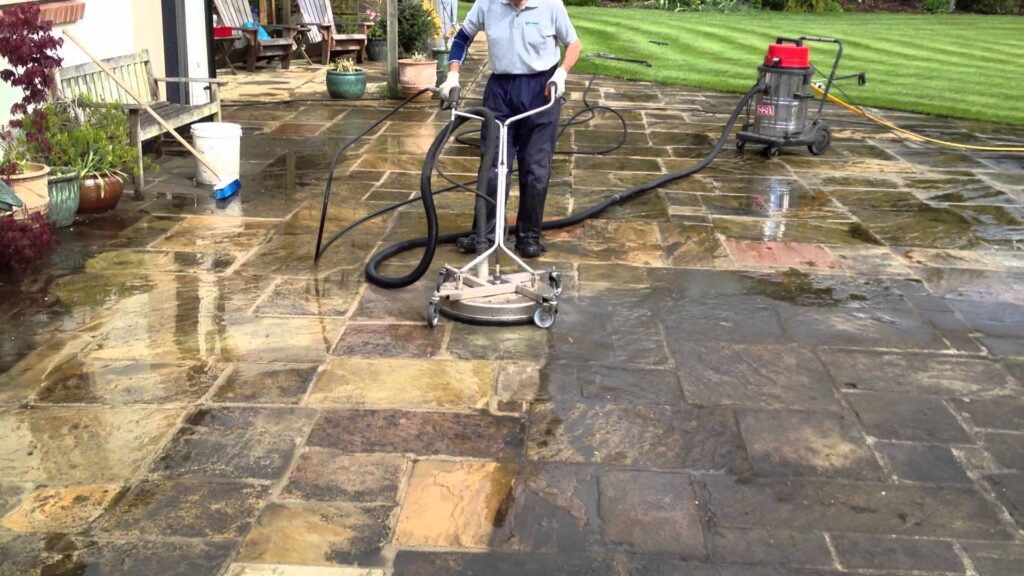
6. Easier maintenance
A sealed surface is much easier to clean and maintain than an unsealed one. Dirt, debris, and other contaminants are less likely to adhere to sealed pavers, meaning you’ll spend less time and effort keeping your outdoor areas looking their best.
Regular sweeping and occasional washing with a mild detergent are typically all that’s needed to keep sealed pavers in top condition. This ease of maintenance is particularly beneficial for large paved areas, where cleaning can be a time-consuming task.
By sealing your pavers, you can reduce the frequency and intensity of your cleaning efforts, freeing up time for other activities.
7. Increased property value
Well-maintained and visually appealing outdoor spaces can significantly enhance the value of your property.
Sealing pavers not only improves their appearance and functionality but also demonstrates a commitment to upkeep and quality. Potential buyers often look for properties with attractive and well-maintained outdoor areas, as these spaces provide additional living and entertaining areas.
By sealing your pavers, you can create an inviting and polished look that can be a key selling point if you decide to put your property on the market. The reduced maintenance needs and enhanced durability of sealed pavers can also be appealing to buyers looking for low-maintenance properties.
When is the right time to seal pavers?
The right time to seal pavers depends on several factors, including the type of pavers, weather conditions, and the curing time required for new installations.
Newly installed pavers need time to settle and cure before they can be sealed. This process usually takes about 3–6 months, depending on the type of pavers and the weather conditions.
During this period, the pavers release moisture, which needs to evaporate completely to ensure proper adhesion of the sealant. Sealing pavers too soon can trap moisture, leading to a cloudy appearance or efflorescence (white, powdery residue).
It’s crucial to seal pavers when the weather is dry. Sealants require time to properly cure, and rain or excessive moisture can interfere with this process. Ideally, choose a period when there is no rain forecast for at least 24–48 hours after application.
The temperature should be moderate when sealing pavers. Most sealants work best when the temperature is between 50°F (10°C) and 90°F (32°C). Extremely hot or cold temperatures can affect the sealant’s curing process and overall effectiveness.
Before sealing, ensure the pavers are thoroughly cleaned. Remove all dirt, debris, stains, and any existing sealant that is peeling or flaking. Pressure washing is often an effective method for cleaning pavers. Allow the pavers to dry completely after cleaning, as moisture can interfere with the sealant’s adhesion and performance.
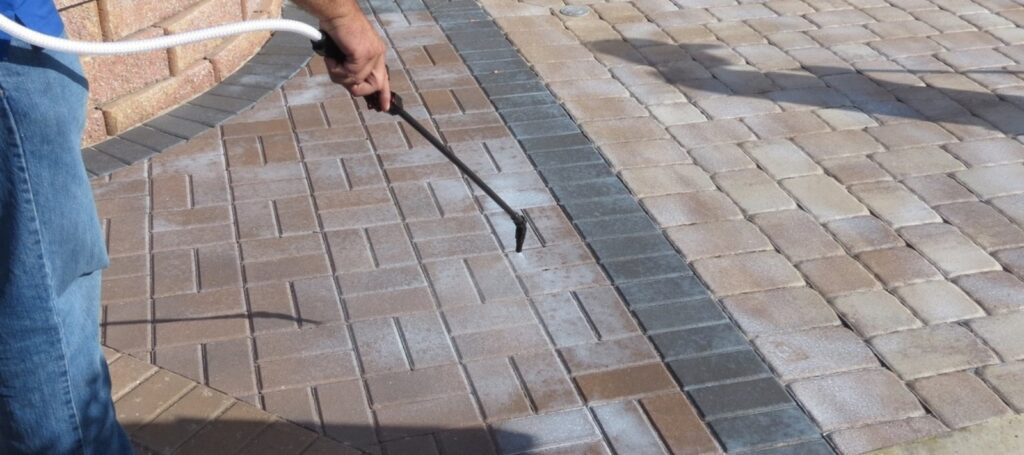
Is it worth investing in sealing pavers?
Yes, without question. Investing in sealing pavers is generally worth it, considering the various benefits it provides in terms of appearance, protection, durability, and maintenance.
It is a simple yet highly effective way to protect and beautify your outdoor surfaces. By taking the time to seal your pavers, you can enjoy a more attractive, resilient, and valuable outdoor space for years to come.
So, if you’re wondering “why seal pavers,” the answer is clear: to preserve and enhance the beauty and functionality of your property.
And there is no better way to make sure you end up with the best possible sealing than hiring professional hardscape contractors to help you. Professionals can help you choose the best type of sealing for your project and help you decide when it is the best time to do so.
And if you happen to be around Sarasota County, FL, you can always count on us here at JS Brick to provide that service for you. With more than 20 years of experience in the hardscape business, we have helped countless homeowners with their sealing needs, and we would be glad to help you on that list.
So get in contact with us today for a free estimate on our services.

